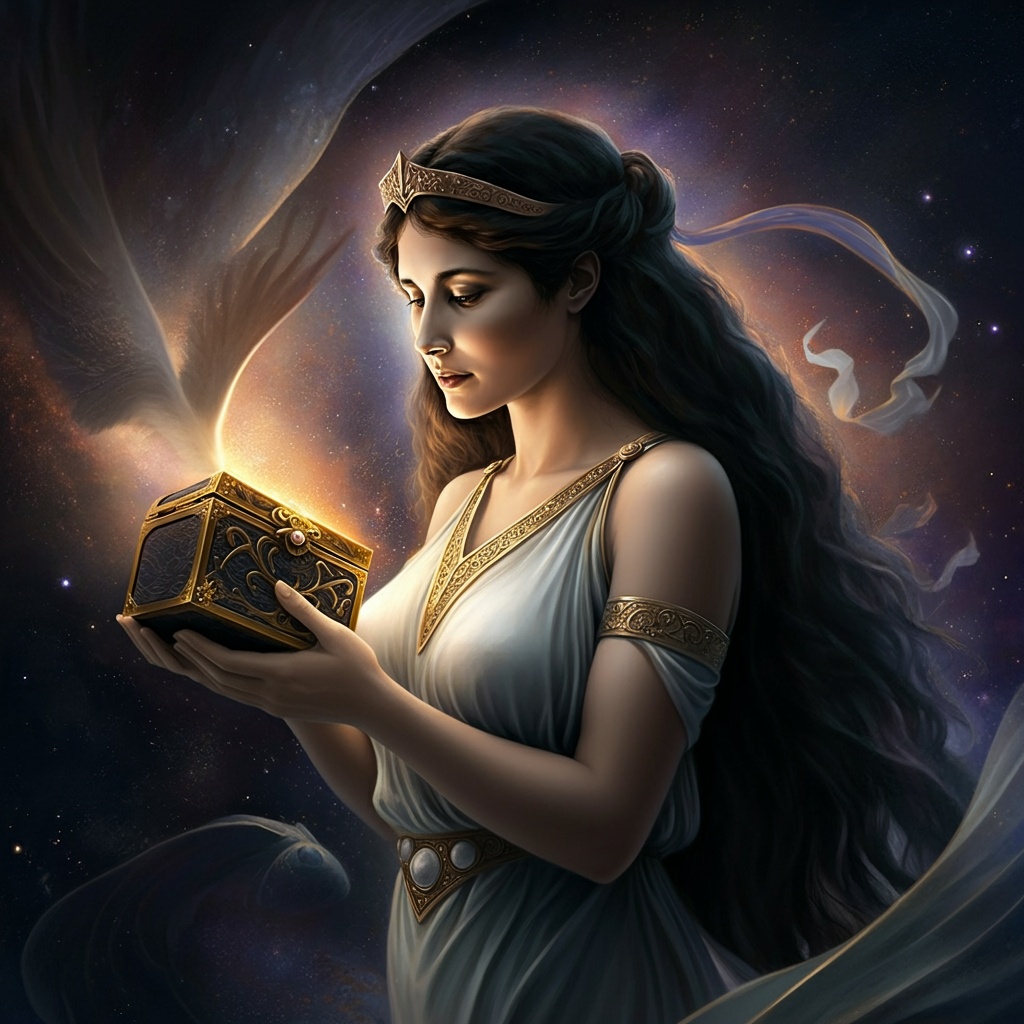Greek mythology is filled with fascinating stories, but few are as thought-provoking as the tale of Pandora. If you’ve ever wondered about the origins of the famous phrase "Pandora's box" or the role Pandora played in mythology, this blog post is for you. Often seen as the first woman created by the gods, Pandora’s story blends themes of curiosity, consequence, and hope. Let’s delve into her myths, symbols, and the enduring questions surrounding her legacy.
Jump to:
- The Creation of Pandora: The First Woman in Greek Mythology
- The Story Behind Pandora’s Box
- What Does Pandora Symbolise?
- Was Pandora Good or Evil?
- Pandora’s Powers
- The Legacy of Pandora’s Box
- Comparisons to Other Myths: Eve and Pandora
- What is the Moral of Pandora’s Box?
- Pandora in Modern Culture
- Frequently Asked Questions About Pandora in Greek Mythology
- Study Greek Mythology for £29
Recommended for you!
Best SellersThe Creation of Pandora: The First Woman in Greek Mythology
In Greek mythology, Pandora holds the title of being the first mortal woman ever created. Her creation was a direct response from Zeus, the king of the gods, to punish humanity after Prometheus stole fire from Mount Olympus and gave it to mortals. Zeus ordered Hephaestus, the god of craftsmanship, to sculpt Pandora from clay, making her incredibly beautiful and lifelike.
The name Pandora means “all-gifted” or “all-giving” in Greek, reflecting the numerous gifts bestowed upon her by the gods.
The Story Behind Pandora’s Box

The tale of Pandora’s box is perhaps one of the most well-known myths in Greek mythology, though it is worth noting that the "box" was originally a jar in the ancient stories. The confusion stems from a mistranslation of the word pithos, which referred to a large storage jar. Let’s dive into this captivating tale.
Zeus’s Plan and Pandora’s Arrival
Zeus, the king of the gods, devised Pandora’s creation as part of a complex punishment for humanity. After Prometheus, a Titan known for his cunning, stole fire from Mount Olympus and gifted it to mortals, Zeus sought to retaliate. The introduction of Pandora into the mortal world was a deliberate act of retribution.
Hephaestus, the god of craftsmanship, sculpted Pandora out of clay, making her the most beautiful mortal ever seen. Each of the Olympian gods contributed to her creation, bestowing her with unique gifts. Aphrodite gave her beauty, Hermes bestowed her with cunning and charm, and Athena taught her various skills. However, these divine gifts came with a hidden motive, as Pandora was meant to serve as both a blessing and a curse to humanity. These gifts ensured that Pandora would be both captivating and fated to play her role in Zeus’s grand plan.
Pandora was presented to Epimetheus, the brother of Prometheus, as a bride. Despite Prometheus’s warnings not to accept gifts from Zeus, Epimetheus was enchanted by Pandora’s beauty and charm. Along with Pandora, Zeus gave a sealed jar (or box) as part of the gift, with strict instructions that it should never be opened.
Pandora’s Curiosity and the Opening of the Jar
Pandora’s tale takes a dramatic turn with her insatiable curiosity—a trait given to her by Hermes. The jar was an irresistible enigma, sitting in her home, tempting her day after day. Though Pandora was warned not to open it, the mystery gnawed at her, growing stronger over time.
Eventually, Pandora could no longer resist. She lifted the lid, releasing a torrent of evils into the world. These included sickness, sorrow, greed, despair, and other afflictions that had been unknown to humanity before that moment. The jar became a symbol of irreversible consequences, as these forces spread rapidly and altered the world forever.
Hope Trapped Inside the Jar
In a desperate attempt to undo her action, Pandora quickly closed the jar. However, by then, most of its contents had already escaped. The only thing left inside was Elpis, the spirit of hope. While the world was now burdened with suffering and despair, hope remained as a small but powerful force to sustain humanity.
This moment carries profound symbolic weight. It suggests that even in the darkest times, hope provides the strength to endure and find meaning in life’s challenges. Without hope, the world would be consumed by despair, making its presence an essential counterbalance to the evils unleashed.
Interpretations of Pandora’s Story
The myth of Pandora’s box can be interpreted in many ways. For some, it serves as a cautionary tale about the dangers of curiosity and disobedience. For others, it reflects the duality of existence—showing that life is a blend of both hardships and the resilience to overcome them. The story also highlights the idea that hope, though intangible, is one of humanity’s greatest assets.
What Does Pandora Symbolise?
Pandora represents duality. On one hand, she is a symbol of life’s blessings—beauty, talent, and intellect. On the other, she embodies human flaws, particularly curiosity and the unintended consequences it can bring.
Was Pandora Good or Evil?
One of the enduring questions surrounding Pandora is whether she was a force for good or evil. The answer isn’t straightforward. Pandora was not inherently evil, but she was a tool in Zeus’s plan to punish humanity. Her act of opening the jar was driven by curiosity, a trait that is neither entirely positive nor negative.
This ambiguity reflects the complexity of human nature, which Pandora herself symbolises. She was created with both virtues and flaws, much like the mortals she was meant to impact.
Pandora’s Powers

Although Pandora is not a goddess in the traditional sense, she is closely associated with divine powers due to her creation. The gifts she received from the gods gave her an almost supernatural allure. Her powers were more symbolic, representing the traits bestowed upon her:
- Beauty and Grace: A gift from Aphrodite, Pandora’s appearance was meant to captivate.
- Intelligence and Curiosity: Hermes gave her a sharp mind and persuasive speech, which contributed to her eventual actions.
- Skill and Dexterity: Athena’s gifts made her skilled in crafts and arts.
The Legacy of Pandora’s Box
The phrase “opening Pandora’s box” has become a metaphor for actions that unleash a series of unintended consequences. The story’s enduring popularity lies in its ability to explain why life is filled with both challenges and hope.
Interestingly, some modern interpretations view Pandora’s act not as a mistake but as a necessary event that brought awareness to humanity. By releasing evils into the world, humans gained the ability to confront and overcome them, with hope as their guiding force.
Comparisons to Other Myths: Eve and Pandora
The myth of Pandora is often compared to the story of Eve in the Bible. Both are seen as the first women in their respective traditions, and both are associated with actions that led to significant consequences for humanity. However, while Eve is tempted by the serpent, Pandora acts on her own curiosity. These parallels highlight themes of choice, consequence, and the pursuit of knowledge.
What is the Moral of Pandora’s Box?

The myth of Pandora’s box teaches several lessons:
- Curiosity can lead to both discovery and danger: While curiosity drives progress, it can also bring unforeseen challenges.
- Hope is a powerful force: Even in the face of adversity, hope remains a guiding light for humanity.
- Actions have consequences: The myth underscores the importance of considering the potential outcomes of one’s choices.
Pandora in Modern Culture
Pandora’s story continues to inspire art, literature, and popular culture. Her name is used in various contexts, from jewellery brands to scientific discoveries. The metaphor of Pandora’s box resonates in discussions about human behaviour and the balance between curiosity and caution.
Recommended for you!
Best SellersFrequently Asked Questions About Pandora in Greek Mythology
Was Pandora a goddess?
Pandora was not a goddess. She was a mortal woman created by the gods, specifically by Zeus, as part of a plan to punish humanity. While she was imbued with gifts from the gods, such as beauty, intelligence, and charm, she remained a human figure in Greek mythology.
Who was Pandora’s husband?
Pandora was married to Epimetheus, the brother of Prometheus. Despite warnings from Prometheus to avoid gifts from Zeus, Epimetheus accepted Pandora as his bride, setting the events of her myth into motion.
What does the story of Pandora explain about Greek beliefs?
The story of Pandora reflects Greek beliefs about human nature, the consequences of disobedience to the gods, and the balance between hardship and hope. It also explains the presence of suffering in the world, offering a mythological explanation for the challenges faced by humanity.
Was Pandora the first woman on Earth?
According to Greek mythology, Pandora was the first mortal woman created by the gods. Her creation mirrors other cultural myths of a first woman, such as Eve in the Bible, but Pandora’s story is unique to Greek mythology.
What happened to Pandora after she opened the jar?
The myth doesn’t provide extensive details about Pandora’s life after opening the jar, but it is implied that she and Epimetheus continued their lives together. Some interpretations suggest that the act of releasing the evils forever changed humanity and Pandora herself, though she remained a significant figure in mythology.
Did Pandora have children?
According to some versions of the myth, Pandora and Epimetheus had a daughter named Pyrrha. Pyrrha and her husband, Deucalion, are central figures in Greek mythology’s flood myth, akin to Noah’s Ark in the Bible.
What is the connection between Pandora’s box and the seven sins?
While Pandora’s myth doesn’t explicitly reference the seven sins, the evils released from her jar can be seen as analogous to human vices, such as greed, envy, and wrath. These parallels make her story a useful tool for exploring morality and human imperfection.
Study Greek Mythology for £29
Pandora’s story is just one of many captivating tales in Greek mythology, full of complex characters and dramatic twists. If you’d like to learn more about these myths and explore the characters, symbols, and stories that have shaped Western culture, consider enrolling in the Greek Mythology Diploma Course with Centre of Excellence. For a limited time, you can access the course at a discounted price of £29!












